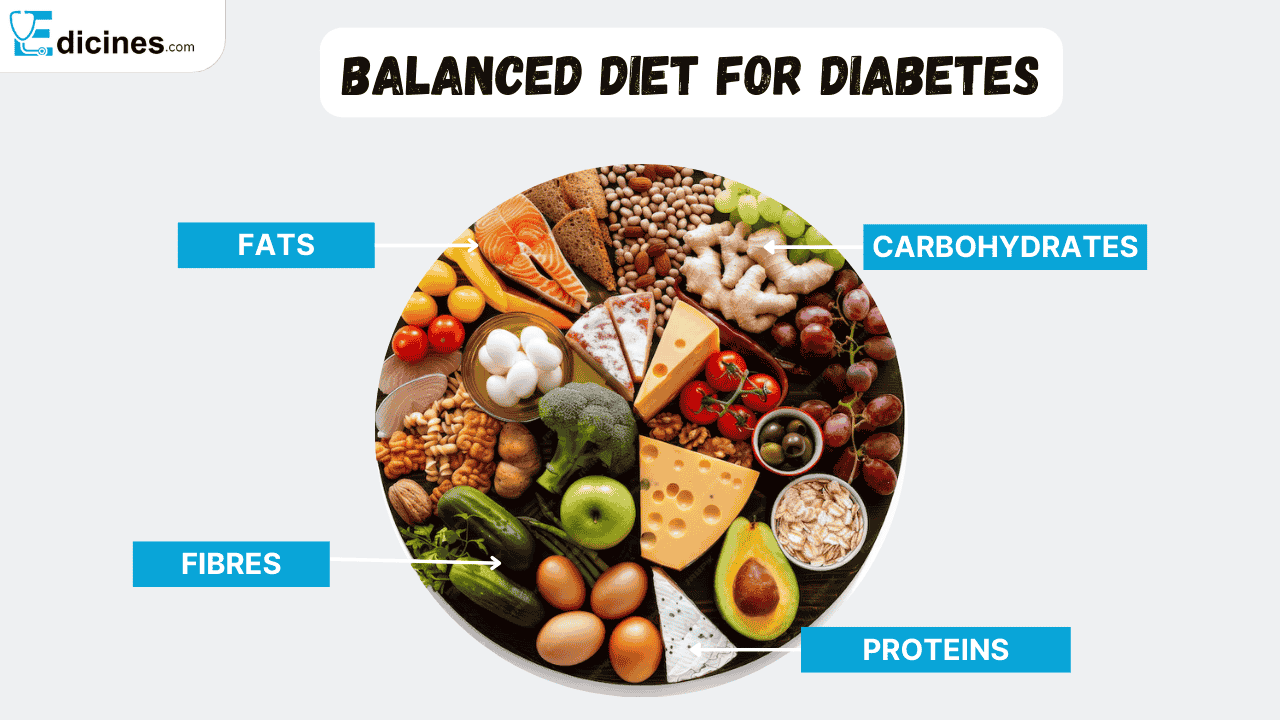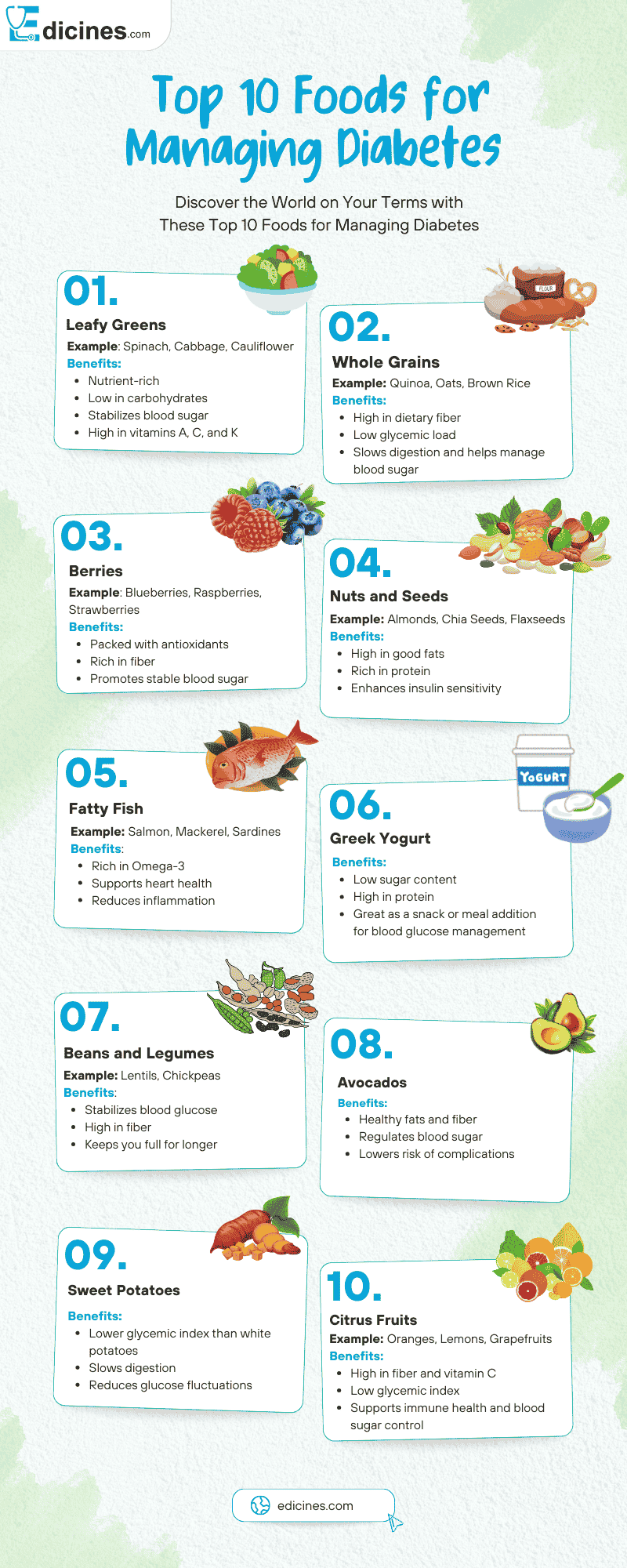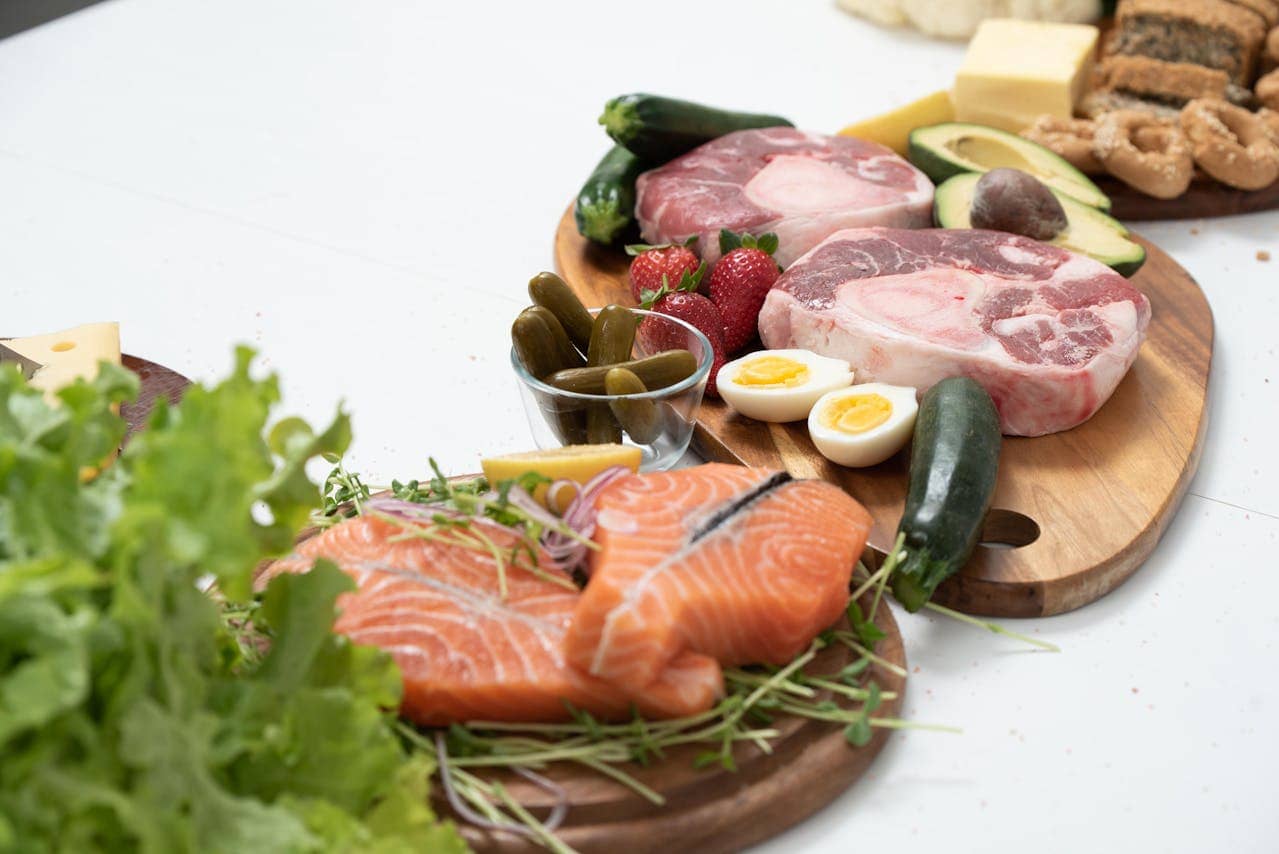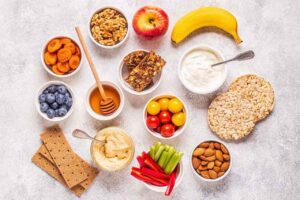Keeping a balanced diet is important for managing blood sugar levels in people with diabetes and preventing long term complications. The right kind of food can have a significant impact on one’s health with respect to diabetes. Here we are going to look at the best foods for diabetics that stabilize blood sugar levels, heighten insulin sensitivity, boost heart health and control weight.
Latest research findings in nutritional science now support various food choices for diabetics that provide much needed nutrients, while also keeping glucose levels balanced. We have already discussed prediabetes; you can read that article as well.
Why Diet is Essential for People Living with Diabetes
One of the best ways to manage blood sugar levels is through a well-structured diabetic diet plan. When it comes to insulin and glucose in our bodies, the diet plays a major role on how it works. The challenge for diabetics is avoiding spikes in blood glucose while ensuring nutrient balance. Diabetes can be managed through proper feeding, complications can be prevented, and in some cases, medications can be avoided entirely.
What is an Ideal Diabetes Diet?

The fundamental nutrients that are involved in regulating blood sugar levels are found in the balanced diet of a diabetic:
Carbohydrates: It is best to go for whole grain carbohydrate sources which are low in glycemic index so as to avoid quick increases in blood sugar levels. Consequently, limit consumption of refined carbohydrates and opt for complex carbohydrates that release glucose gradually.
Proteins: By including lean protein sources such as chicken breasts, fish fillets and plant proteins into their diabetes meal plans, people with diabetes will be able to maintain stable levels of glucose within their bodies.
Fats: Diabetics should give priority to healthy fats found in avocados, nuts and olive oil since these promote heart health.
Fiber: Fiber-rich foods like vegetables, fruits, bran cereal, and legumes slow down the absorption of sugar into the bloodstream, thus helping to control its levels.
Ten greatest foods for diabetic people
When it comes to food choices that have diabetes management benefits as well as nutrient content here is a list:
Leafy Greens
Spinach, cabbage and cauliflower belong to leafy green category full of nutrients and no-starch at all. They possess low carbohydrate constituents together with exceptionally high levels of vitamins A,C and K that allow them help and maintain blood sugar levels constant throughout an individual’s life.
Whole grains
Whole grains such as quinoa, oats and brown rice have high amounts of dietary fiber that creates a low glycemic load on the carbohydrates.
Berries
Berries like blueberries, raspberries and strawberries give antioxidants and dietary fiber which keeps blood sugar levels stable thus promoting better health.
Nuts and Seeds
Almonds, chia seeds and flaxseeds are rich in good fats along with proteins. They also improve insulin sensitivity making it suitable for patients with diabetes.
Fatty Fish
Fatty fish such as salmon, mackerel or sardines contain omega-3 fatty acids leading to a healthier heart while reducing inflammation rates; this is important for individuals living with diabetes.
Greek Yogurt
Greek yogurt is low on sugar content yet rich in proteins hence making it serve as a great snack food or part of meal plan for anybody who need to keep their blood glucose at bay.
Beans and Legumes
Beans (such as lentils or chickpeas) stabilize glucose levels in the blood and also help individuals feel fuller compared to if they did not include them in their diets.
Avocados
Avocados consist of both healthy fats and fibers that regulate sugar levels hence reduce
chances of getting ill – this is important especially for persons suffering from diabetes mellitus.
Sweet Potatoes
When compared with white potatoes sweet potatoes have lower glycemic index causing slower rates of digestion that consequently leads to less fluctuation in glucose concentrations within the human body.
Here is a infographic on Top 10 Foods for Managing Diabetes.

What Foods Should Diabetics Limit or Avoid?
While it is essential to incorporate healthy foods, there are also some foods we need to avoid to prevent blood sugar spikes.
Sugary Beverages and Sweets
Sugary beverages such as soda and fruit juices together with candy and desserts bring about rapid increases in blood sugar hence making them dangerous for diabetics.
Refined Carbohydrates
White bread, pasta, as well as pastries contain refined carbohydrates rich in glycemic index while lacking fiber; thus they should be prevented so as not to experience variations in blood sugar levels.
Trans Fats and Processed Foods
Fast food, processed snacks and product(s) containing trans fat can enhances insulin resistance and make diabetes worse.
High Sodium Food
Processed high sodium foods can raise the probability of high blood pressure which is common among people with diabetes. Therefore it is very important for diabetics to control their intake of sodium.
How to Make a Diabetes-friendly Meal Plan
A diabetes meal plan that is well-structured contains food that is balanced in order to stabilize blood sugar levels while providing essential nutrients.
Breakfast Choices
For breakfast, some of the meals you can have include oatmeal topped with berries or scrambled eggs paired with avocado. The choices provide much balance between carbohydrates, proteins and fats.
Lunch and Dinner Options
Grilled chicken served alongside leafy greens, quinoa salads or fish tacos with whole grain wrap are examples of good lunch or dinner options. These have balanced nutrients and are low on glycemic index.
Snack Ideas
Healthy snacks such as nuts, Greek yoghurt and hummus with vegetables can help maintain stable blood sugar levels until the next meal.
Tips on Portion Control
Diabetics should pay attention to portion sizes and read nutrition labels so that they do not end up taking too many carbs at once.
Tips for Controlling Blood Sugar with Food
Blood sugar management does not have to be hard if these points are taken into account;
Eat Small, Frequent Meals
Eating little meals more often enables one’s glucose levels remain constant hence preventing sudden spikes in blood sugar levels.
Pair Carbs with Proteins
Whenever you eat carbohydrate rich foods, it is advisable to accompany them with protein or healthy fats.
Stay Hydrated
Drinking plenty of water throughout the day helps to regulate blood sugar levels and prevent dehydration.
Conclusion
Integrating the best diabetic food into your everyday dietary routine will assist you in controlling sugar levels and promote good health. If you stick to a systematic diabetic diet plan and make intelligent food choices then it will make your life more enjoyable. Personalize your menu with an expert in health care or nutritionist to make sure that you are going along the right line.













